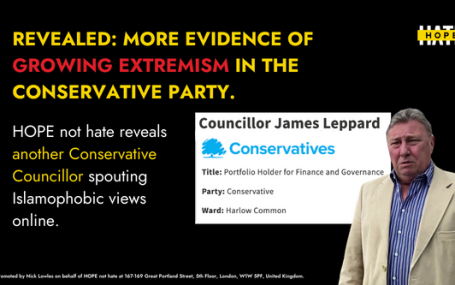HOPE not hate uses cookies to collect information and give you a more personalised experience on our site. You can find more information in our privacy policy. To agree to this, please click accept.
The All-Party Parliamentary Group (APPG) on refugees published the report, “Refugees Welcome?” on 25 April showing a two-tier system had developed, with refugees arriving through government-led resettlement programmes receiving more support than those that had arrived as asylum seekers.
The APPG called for the next government to create a minister for refugees to fix this imbalance, and help refugees overcome the barriers preventing them from contributing to the UK. The report states:
“That two refugees who could have fled from the same country, the same town, even the same neighbourhood could have such different experiences of what it means to be a refugee in the UK is unacceptable.”
After a successful application by the asylum seeker, the newly-recognised refugees are given a month ‘move-on’ period before they are forced to leave their accommodation:
“Coupled with the lack of support for refugees to navigate the social security system and private housing market, the brevity of the move-on period leaves too many newly recognised refugees homeless and destitute.”

Nearly 10,000 people were granted refugee status in Britain last year via the asylum route, while around 3,500 refugees were resettled directly from other countries.
Kolbassia Haoussou, from the Survivors Speak Out network for torture survivors, told researchers that after achieving refugee status, he was homeless for three days, sleeping on overnight buses.
“You sit on the back, where it is warm, where the engine is. You just go from one terminal bus stop to another terminal bus stop until the morning.”
The parliamentary group also highlighted administrative delays for needed documents; incomplete advice by Jobcentre staff; and poor English language support as obstacles for refugees trying to access housing and benefits.
The report calls for the 28-day support period for new refugees to be extended to 50 days, which reflects a better “reality” of the time needed.
“For too many refugees, being granted their status is the beginning of a period characterized by homelessness and destitution. Protection must mean more than just a piece of paper” – Conservative MP David Burrowes, APPG on Refugees vice-chairman
The report also found that female refugees were particularly at risk of sexual violence once they arrived in the UK, due to language barriers and their financial dependency on a partner.
Under the last Labour government, the Refugee Integration and Employment Service programme gave 12 months of support to access housing, education, social security and the job market. After this was ended by the Coalition government in 2011, no support service for newly recognized refugees has been provided. The APPG has asked for such a system to be re-introduced.
Labour MP Thangam Debbonaire, head of the APPG, said:
“Creating a two-tier system for refugees, loading the dice against people who come here to build a new life, is not just the wrong thing to do, but a costly missed opportunity for Britain.”
Kolbassia added: “Not everybody is Mo Farah, but everybody has something to give to this country.”
Last week a study published by Harvard University revealed the growing epidemic of sexual exploitation and abuse of migrant children in Greece. The country holds 62,000 asylum seekers due to border closures in Europe.
One psychologist at a camp in Athens said:
“We had a case of a 4-year-old girl who was raped. The mother did whatever was possible to report it. She was devastated and enraged.”
Unaccompanied children are the most vulnerable subset, with many resorting to transactional sex to survive in the camps, which often leads to the drug trade. One Medicins Sans Frontieres (MSF) doctor told the researchers:
“It’s really hard for the unaccompanied children…to survive. It’s the survival of the fittest in there.”

Security is inexistent. According to one unaccompanied child:
“… anyone can go in and out through [the fence] including dangerous individuals who don’t live here and whose aim is to sell drugs or do other bad things.”
The weak structure causes children to routinely fall victim to gangs who threaten to take humiliating photos of them and send it back to their families if they don’t comply.
“Even if children survive physical or sexual abuse at their hands, the prospect of having their families know about this is even more devastating” – research participant at a camp.

Cllr James Leppard expressed Islamophobic sentiments and endorsed abuse of Sadiq Khan HOPE not hate can reveal further evidence of the growing problem of extremism…